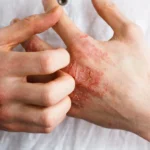What is eczema?
Eczema, also known as atopic dermatitis, is a chronic skin condition characterized by inflammation, redness, and irritation and is treatable by UVB Phototherapy. It often develops in childhood but can appear at any age. Eczema is thought to result from a combination of genetic, environmental, and immune system factors.
Symptoms of eczema
The symptoms of eczema can vary widely but often include dry, itchy skin that may crack or bleed. Inflamed red or brownish-gray patches and small, raised bumps that may leak fluid when scratched are also common. Episodes of eczema can flare up periodically, often triggered by allergens, irritants, or stress.
Who can be affected by eczema?
Eczema can affect anyone, though it is especially common in infants and young children. Adults may also develop eczema, particularly if they have a history of the condition or a family history of allergic disorders like asthma or hay fever.
What is psoriasis?
Psoriasis is a chronic autoimmune disease that accelerates the life cycle of skin cells, causing them to build up and form scales and red patches. This condition can range from mild to severe and may be accompanied by systemic issues such as arthritis in some individuals.
Symptoms of psoriasis
Symptoms of psoriasis include thick, scaly skin lesions that are often red and covered with silvery-white scales. These patches can become itchy, inflamed, or even painful. Psoriasis is commonly found on areas like the scalp, elbows, knees, and lower back but can appear anywhere on the body.
Who can be affected by psoriasis?
Psoriasis can affect people of all ages, but it most commonly develops between the ages of 15 and 35. Genetics can play a significant role, and individuals with a family history of the condition are at higher risk. Environmental triggers, stress, and infections may also contribute to flare-ups.
Know the difference between eczema and psoriasis
Appearance
Eczema typically presents with dry, inflamed, and sometimes oozing skin, while psoriasis appears as thick, scaly patches with a silvery sheen. The texture and severity of the plaques or patches help distinguish between the two conditions.
Itching
Intense itching is a hallmark of eczema and can sometimes lead to vigorous scratching that further aggravates the skin. Psoriasis may also cause itching, but the sensation is often less severe compared to eczema.
Location
Eczema often affects the bends of the elbows and knees, wrists, and neck. Psoriasis, on the other hand, commonly appears on the scalp, elbows, knees, and lower back but can extend to other areas, including the nails.
Treating eczema
Eczema treatments typically focus on soothing inflammation and relieving itching. This often includes moisturizing creams, corticosteroid creams, and antihistamines. For more severe cases, doctors may recommend immunosuppressants, biologics, or phototherapy.
Treating psoriasis
Psoriasis treatment aims to slow the growth of skin cells and manage symptoms. Common options include topical treatments like corticosteroids, vitamin D analogs, and salicylic acid. Systemic treatments, including biologic medications and phototherapy, may be used for more severe cases. Lifestyle changes, such as stress management and avoiding triggers, are also crucial in managing the condition. Additionally, support groups and counseling can help patients cope with the emotional impact of living with psoriasis.
Topical treatments
Topical treatments are applied directly to the skin and are often used as a first-line treatment for psoriasis. These medications aim to reduce inflammation, slow down skin cell growth, and alleviate symptoms such as itching and scaling. Some commonly prescribed topical treatments for psoriasis include:
- Corticosteroids: These anti-inflammatory drugs come in different strengths and forms, including creams, ointments, lotions, gels, and foams. They work by reducing redness, swelling, and itching.
- Vitamin D analogs: Synthetic forms of vitamin D that help regulate skin cell growth, reduce inflammation, and improve the skin’s barrier function.
- Topical retinoids: Derived from vitamin A, these medications help slow down skin cell growth and reduce inflammation. They may also improve skin appearance and texture.
- Salicylic acid: This ingredient helps loosen scales and relieve itching by softening the skin’s outer layer.
- Coal tar: A byproduct of coal processing that can help reduce scaling, inflammation, and itching.
In addition to topical treatments, phototherapy (light therapy) is another common treatment option for psoriasis. This type of treatment involves exposing the affected areas of skin to natural or artificial ultraviolet light on a regular basis. Phototherapy can be an effective treatment for psoriasis, as the UV light can slow down the production of skin cells and reduce inflammation.
Another important aspect to consider in managing psoriasis is lifestyle changes. While there is no specific diet that has been proven to cure or improve psoriasis symptoms, it is recommended to maintain a well-balanced and healthy diet. This includes eating plenty of fruits and vegetables, lean proteins, whole grains, and healthy fats. It’s also important to stay hydrated by drinking enough water throughout the day.


